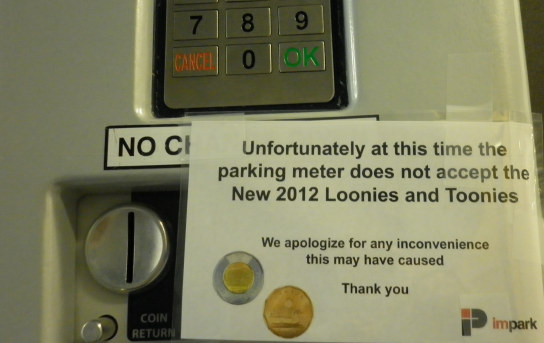By Jennifer Colbourne (The Cascade) – Email
Print Edition: May 23, 2012
Most of us didn’t pay attention when it was announced that the government was changing the metal content of loonies and toonies this year. Why would we? It didn’t seem very interesting.
Then things got interesting.
Suddenly, coins that looked more like play money than actual currency started appearing. Once the surprise died down and it was settled that, no, the bank wasn’t trying to rip us off with fake coins, that should have been the end of it. We would have quickly gotten used to our ultra-light, super shiny toy coins that, honestly, go very well with our multi-coloured toy bills.
Ah, but no, though they may not be fake coins, like fakes, they can’t buy you anything. That’s right, your money is useless in pretty much all the places you need loonies and toonies: parking meters, laundromats, vending machines and anything else with a coin dispenser.
So what’s wrong? They’re lighter. Quick science fact: steel is lighter than nickel. And this is what is screwing up the machines.
However, steel is also cheaper than nickel. We are told that Canadians will be saving $16 million a year by making the switch.
It’s confusing. We want to feel gratified that the government is saving us money. Yet, when our coins are mercilessly swallowed by the machines we’ve trusted and loved for so long, we can’t help but feel pissed.
Undoubtedly, the numerous businesses that are stuck paying to alter their machines are also feeling pretty pissed. Actually, I’d say very pissed. And somehow, I don’t have the feeling that the government is going to make it up to them with any of that $16 million (because they’re not). Doesn’t seem very fair, does it? Just be thankful you don’t own a vending machine company.
But back to the savings. Coins that once cost 30 cents to make will now cost something more like five cents to make. Wait, but isn’t a loonie worth 100 cents, and a toonie 200? Yes, right, just don’t think about it too hard. What do we plebeians know? Money isn’t actually worth what it’s worth. Not unless we bring back the golden doubloon.
It seems to me that physical money is becoming redundant. Do note that we’ve ditched the penny because pennies were deemed too expensive to make. People are already talking about the useless expense of the nickel, too. The fact of the matter is that bills and coins are symbolic, nothing more. We need physical currency to be cheap to produce because literally we’re spending money on nothing.
And do you know what’s cheaper than making coins? Not making them.
I’m not talking about bringing back the $2 bill. Aside from those few machines mentioned earlier, how often do we really use coins, and for that matter, how often do we use bills? No, it’s all about credit and debit cards. Without noticing it, we’ve already shifted to a primarily electronic-based currency.
Coins and bills are expensive to produce. They’re cumbersome. They’re forgeable. They’re dirty. They’re even dangerous – nobody carries large amounts of cash on them, for fear of being mugged. You can’t protect the $100 bill in your pocket with a pin number.
Undoubtedly, the idea of getting rid of physical currency makes us feel uneasy. The reality is, though, that we’re already far down that path. Rather than inconvenience everybody by changing coin composition, I say it’s time to start phasing out coins completely. A lot of companies have already started doing this—most parking meters accept credit cards now, as do a few vending machines—because the fact is nobody carries coins on them.
I’m no economist. I can’t tell you how we go about losing physical currency, nor the economic implications of such a move. All I know is that it’s already happening. When was the last time you used cold hard cash, even for a small purchase? Can you pay at the till when a business’s credit and debit machine goes down? Do you regularly carry more than $100 in your pocket? Can you shop on e-bay with a $20 bill? My point exactly.
Come on, Canada. Let’s really save ourselves some money. It’s time to stop manufacturing it!


